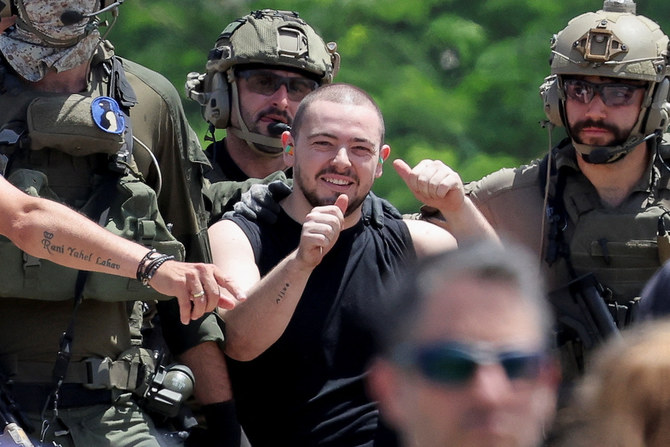JERUSALEM/CAIRO: Israeli forces rescued four hostages held by Hamas since October in a raid in Gaza on Saturday while over 200 Palestinians were killed in airstrikes in the same area, according to Hamas officials, in one of the bloodiest Israeli assaults of the war.
It was not immediately clear if the hostage rescue and the Israeli air assault were part of the same operation but both took place in central Gaza’s Al-Nuseirat, a densely built-up and often embattled area in the eight-month-old war between Israel and Hamas, the Palestinian territory’s ruling Islamist group.
An Israeli military spokesperson said the hostage rescue operation unfolded under fire in the heart of a residential neighborhood, where he said Hamas had been hiding captives among Gaza civilians under guard by armed militants.
Israeli forces returned fire, including with airstrikes, added the spokesperson, Rear Admiral Daniel Hagari. An Israeli special forces commander was killed during the operation, a police statement said.
Israel named the rescued hostages as Noa Argamani, 26, Almog Meir Jan, 22, Andrey Kozlov, 27, and Shlomi Ziv, 41. They were taken to hospital for medical checks and were in good health, the military said.
They were all kidnapped from the Nova music festival during the deadly raid by Hamas-led Palestinian militants on Israeli towns and villages near Gaza on Oct. 7, which precipitated the devastating war in the Hamas-run enclave.
Hamas’ raid killed some 1,200 people, according to Israeli authorities, and Israel’s subsequent bombardment and invasion of Gaza has killed at least 36,801 Palestinians, according to an updated tally by the territory’s health ministry on Saturday.
CALL TO PRESIDENT
Gunmen took around 250 hostages back to Gaza on Oct. 7. There are 116 now left in the coastal enclave, according to Israeli tallies, including at least 40 whom Israeli authorities have declared dead in absentia.
Israeli News 12 broadcast footage of Argamani reunited with her father, smiling and embracing him. Video of Argamani’s kidnapping, showing her shouting “Don’t kill me!” as she was driven into Gaza on a motorbike, circulated soon after she was taken on Oct. 7.
A smiling Argamani was shown speaking by phone to Israeli President Isaac Herzog from hospital surrounded by family and friends, in footage released by the president’s office.
“Thank you for everything, thank you for this moment,” she said.
“I am so excited to hear your voice, it brings tears to my eyes ... Welcome home,” Herzog said.
Poland praised the rescue of the hostages and said that one is a dual Israeli-Polish citizen.
BLOODY SCENES
A different picture unfolded back in Gaza, where Palestinian health ministry officials and local medics said that an Israeli military assault in Nuseirat had killed scores of people including women and children.
The ministry did not say how many of the fatalities were combatants.
The Hamas-run government media office in Gaza said later the death toll had risen to at least 210 Palestinians with many more wounded, after medics and health officials gave earlier tolls of up to 100 dead. There was no immediate confirmation of the highest figure from Gaza’s health ministry.
Social media footage that Reuters could not immediately verify showed bodies spilling entrails onto bloodstained streets.
“It was like a horror movie but this was a real massacre. Israeli drones and warplanes fired all night randomly at people’s houses and at people who tried to flee the area,” said Ziad, 45, a paramedic and resident of Nuseirat, who gave only his first name.
The bombardment focused on a local marketplace and the Al-Awda mosque, he told Reuters via a messaging app. “To free four people, Israel killed dozens of innocent civilians,” he said.
Emergency response teams sought to ferry the dead and wounded to hospital in the nearby city of Deir Al-Balah but many bodies were still lying in the streets, including around the market district, Ziad and other residents said.
Nuseirat, a historic Palestinian refugee camp, has been subjected to heavy Israeli bombing during the war and there has also been fierce ground fighting in its eastern areas.
The Gaza war shows no signs of slowing even as Israel’s chief ally the United States presses for a ceasefire and a deal that would free the remaining hostages held by Hamas in exchange for releases of Palestinians imprisoned in Israel.
The war has destabilized the wider Middle East, drawing in Hamas’s main backer Iran and its heavily armed Lebanese ally Hezbollah, which Israeli officials are threatening to go to war with on Israel’s northern border.


























